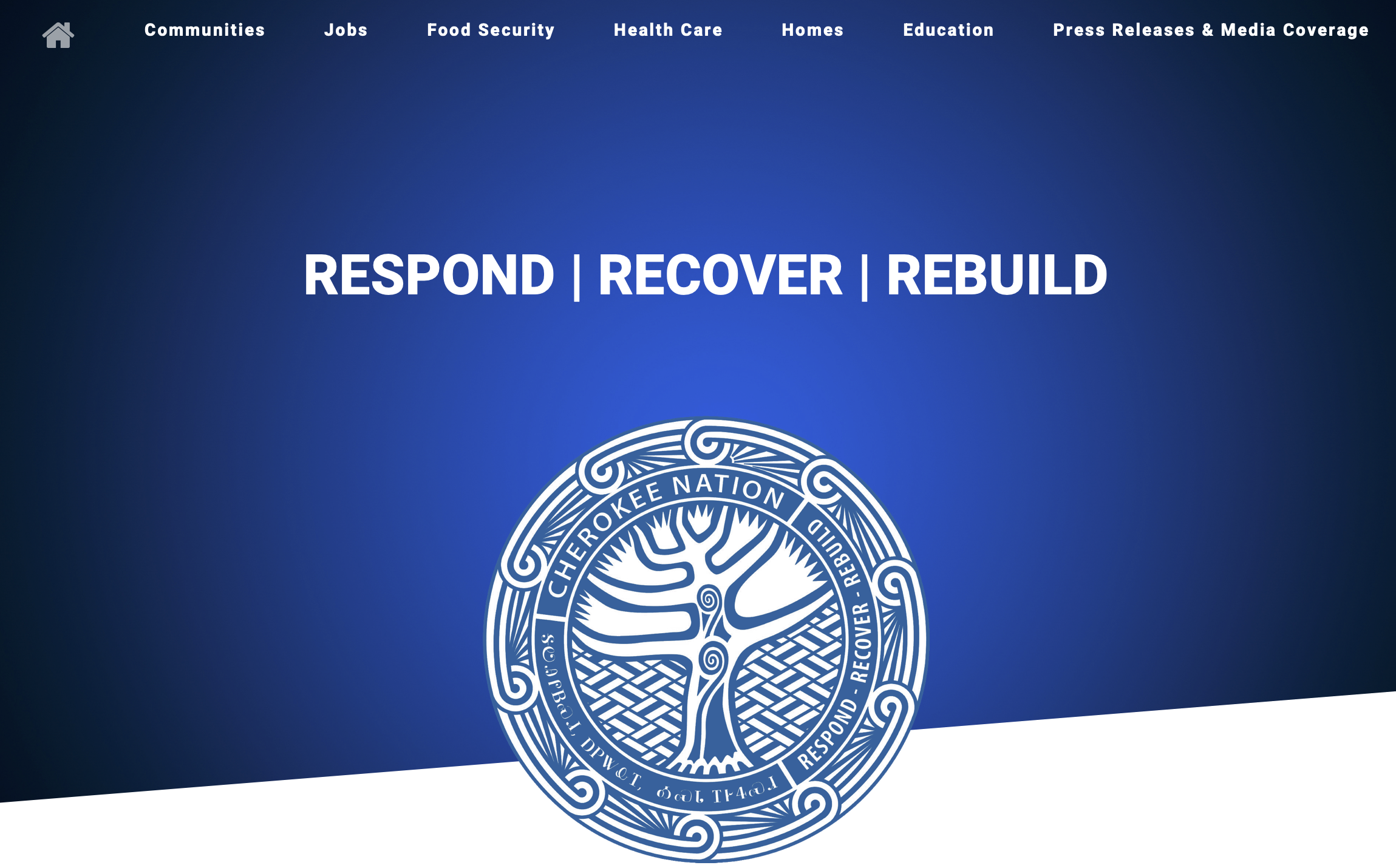Indianz.Com > News > Chuck Hoskin: Cherokee Nation details response to COVID-19 pandemic

New website shows where the money goes for Cherokee Nation’s pandemic response
Monday, February 8, 2021
Cherokee Nation
The COVID-19 global pandemic has been hard on us all, but Cherokee Nation did not sit back while the pandemic threatened our health and our economy. With these efforts, the past year has been challenging, transformative, and finally, hopeful.
In March 2020, the U.S. federal government passed the CARES Act to help individuals, businesses, state and local governments, and tribes, including Cherokee Nation, respond to the pandemic emergency. Cherokee Nation has responsibly spent more than $410 million of our CARES Act funding through our Respond, Recover and Rebuild spending plan.
Cherokee Nation used our relief dollars on community needs like housing, food security and utility bill assistance. We helped tribal citizens meet basic needs like food, shelter, health care and clothing while the pandemic continues to pose a danger. We invested in protecting our workers from layoffs, helping Cherokee elders stay safe at home, and helping Cherokee students safely continue their educations through distance learning.
We had to move quickly to get these investments to our communities, but we also want to ensure maximum transparency and accountability to the Cherokee people. That’s why the Cherokee Nation Treasurer recently released the COVID-19 Respond, Recover, Rebuild Spending Report. It can be found at respondrecoverrebuild.com. The new website is a centralized information source for Cherokees to ensure that their tribal government is transparently and effectively managing coronavirus recovery funds. It shows a breakdown of spending and the number of ways tribal citizens have received assistance. We are proud to have delivered direct assistant to more than 130,000 citizens and helped thousands more through essential programs that we’ve created or expanded with CARES Act funds. As we get more Cherokees vaccinated and begin to put this pandemic behind us, we will continue to ensure financial transparency and open communication with our citizens. Cherokees have the right to know how relief dollars are being used. I applaud the Cherokee Nation’s financial team for their resiliency, adaptability, and professionalism. Despite the turmoil across northeast Oklahoma and the globe over the past year, Cherokee Nation has remained in good financial shape. Other highlights from the past year include:Cherokee Nation shares COVID-19 Respond, Recover, Rebuild spending report https://t.co/y6vHVY1HBh @CherokeeNation pic.twitter.com/ddfYxC9fSf
— Anadisgoi (@Anadisgoi) January 29, 2021
- $177 million for jobs so that employees did not miss a paycheck or experience layoffs in the past year.
- $54 million to individual citizens for emergency relief, clothing assistance, utilities and other needs.
- $38 million for PPE and safety supplies, including developing Cherokee Nation’s N95 and N99 mask production. Once operational, the Cherokee Nation will be the only manufacturer of N99 masks in the United States.
- $22 million for public health infrastructure like new employee health clinics, expanded domestic violence shelters, and community water line and water treatment improvements.
- $19 million in technology grants to help students purchase necessary equipment for distance learning.
- $27 million toward improving broadband connectivity, including sending more than 9,000 mobile Wi-Fi hotspots with a year of free service to Cherokee Nation citizens with no internet connectivity.
- $27 million to address food security, including the construction of five new food distribution centers, a meat processing facility and additional refrigerated trucks.
Chuck Hoskin Jr. is the 18th elected Principal Chief of the Cherokee Nation, the largest Indian tribe in the United States. He is only the second elected Principal Chief of the Cherokee Nation from Vinita, the first being Thomas Buffington, who served from 1899-1903. Prior to being elected Principal Chief, Hoskin served as the tribe’s Secretary of State. He also formerly served as a member of the Council of the Cherokee Nation, representing District 11 for six years.
Search
Filed Under
Tags
More Headlines
Ernie Stevens: Protecting tribal sovereignty in a new political era
Rhonda LeValdo and Gaylene Crouser: Not In Our Honor
AUDIO: Legislative Hearing on H.R.410, H.R.412, H.R.504 & H.R. 741
Native America Calling: Native in the Spotlight with Tatanka Means
VIDEO: ‘Thank you for your leadership’: Sen. Lisa Murkowski (R-Alaska) to Sen. Brian Schatz (D-Hawaii)
VIDEO: Senate Committee on Indian Affairs Organizational Business Meeting
Alaska Beacon: Trump administration faces lawsuit over tribal gaming facility
Native America Calling: Medicaid’s next chapter in Indian Country
H.R.43, the Alaska Native Village Municipal Lands Restoration Act
H.R.42, the Alaska Native Settlement Trust Eligibility Act
H.R.226, the Eastern Band of Cherokee Historic Lands Reacquisition Act
House Subcommittee on Indian and Insular Affairs holds first hearing
Native America Calling: Rising home insurance rates put more Native Americans at risk
Citizen of Navajo Nation tapped for Indian Affairs post
Native America Calling: Native Bookshelf with Ann-Helén Laestadius
More Headlines
Rhonda LeValdo and Gaylene Crouser: Not In Our Honor
AUDIO: Legislative Hearing on H.R.410, H.R.412, H.R.504 & H.R. 741
Native America Calling: Native in the Spotlight with Tatanka Means
VIDEO: ‘Thank you for your leadership’: Sen. Lisa Murkowski (R-Alaska) to Sen. Brian Schatz (D-Hawaii)
VIDEO: Senate Committee on Indian Affairs Organizational Business Meeting
Alaska Beacon: Trump administration faces lawsuit over tribal gaming facility
Native America Calling: Medicaid’s next chapter in Indian Country
H.R.43, the Alaska Native Village Municipal Lands Restoration Act
H.R.42, the Alaska Native Settlement Trust Eligibility Act
H.R.226, the Eastern Band of Cherokee Historic Lands Reacquisition Act
House Subcommittee on Indian and Insular Affairs holds first hearing
Native America Calling: Rising home insurance rates put more Native Americans at risk
Citizen of Navajo Nation tapped for Indian Affairs post
Native America Calling: Native Bookshelf with Ann-Helén Laestadius
More Headlines